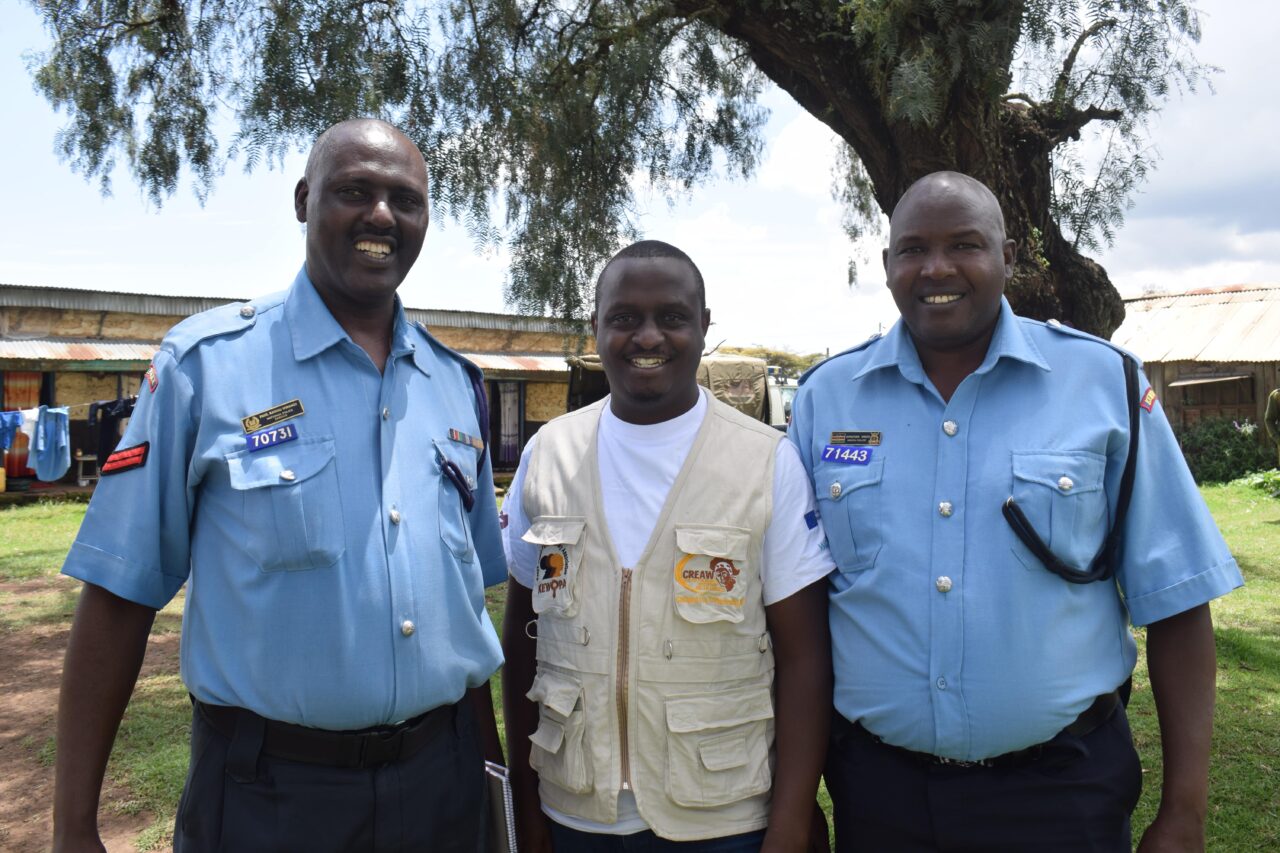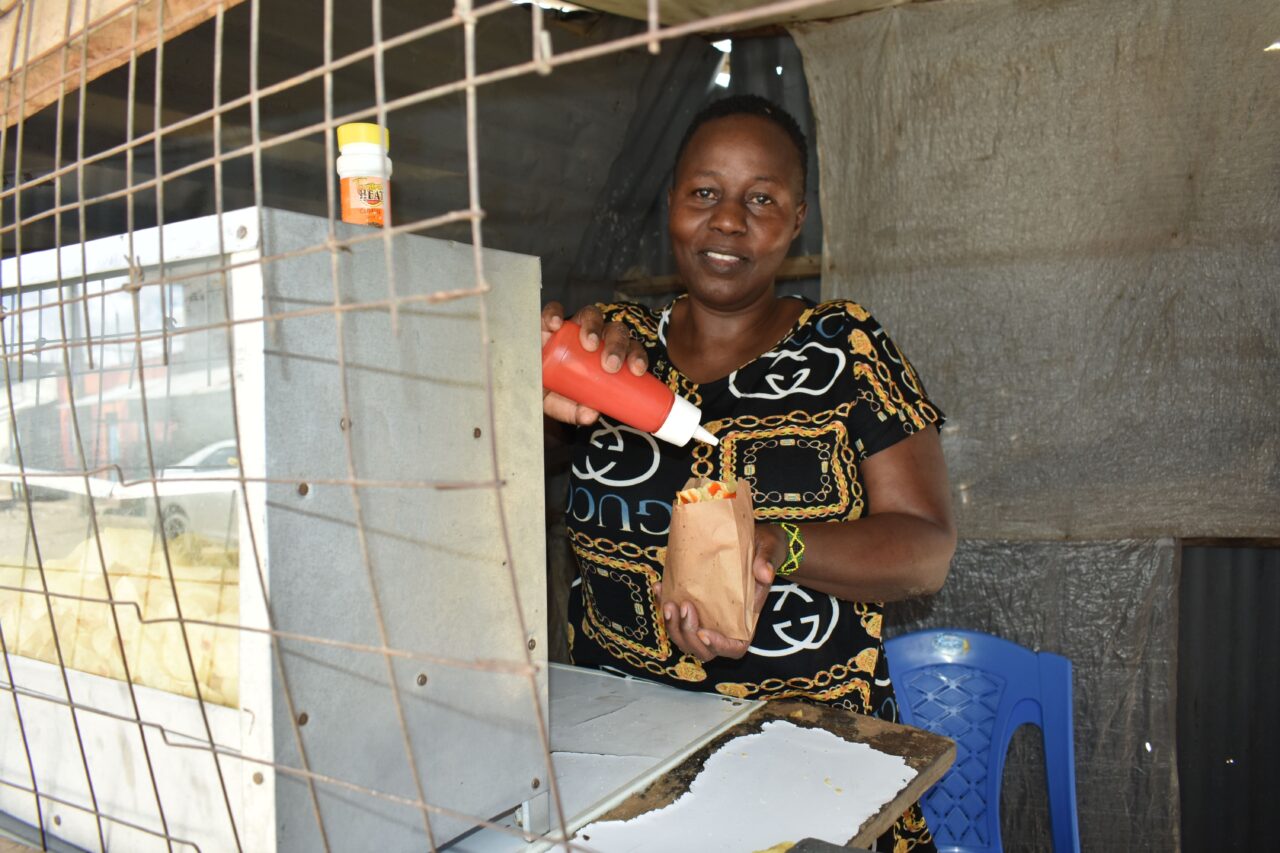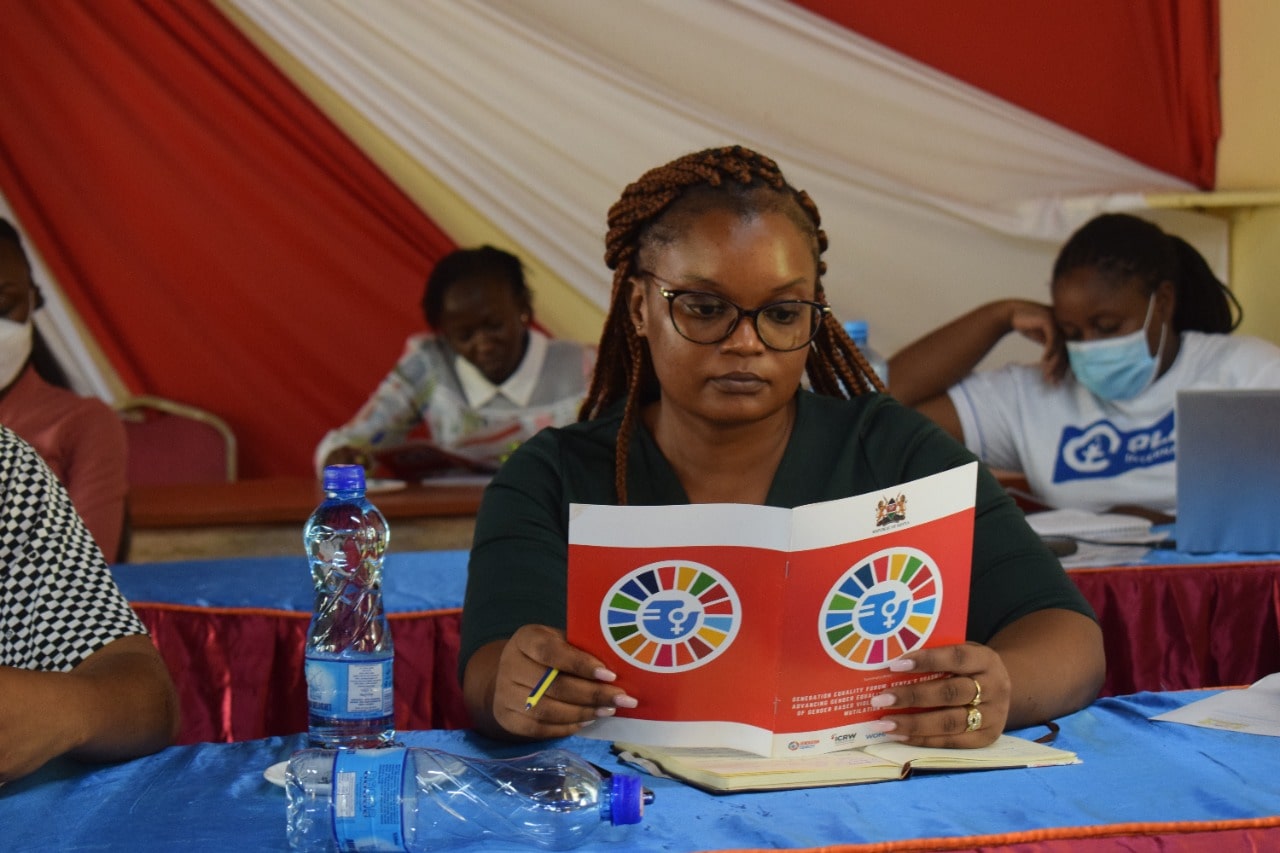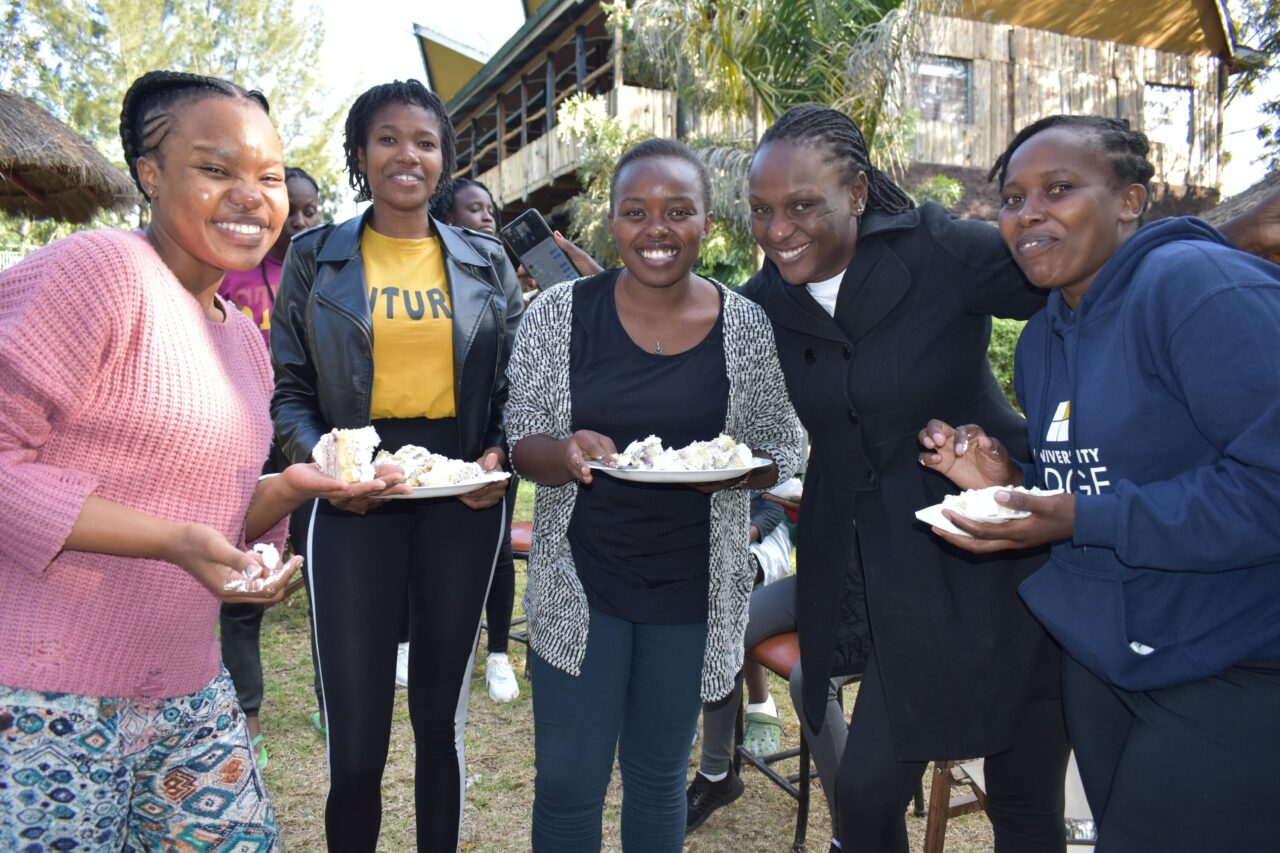Corporal Paul Kamau Mwangi, is a police officer at Nairegi Enkare police station in Narok county, who is a crimes and investigations officer that deals with cases of Gender based Violence (GBV). The broad smile on his face and warm reception is one key element in helping survivors of GBV feel comfortable around him hence easily opening up. However, this was never the case before.
Corporal Kamau has been part of a group of police officers trained by CREAW on handling GBV cases, collection of exhibits and preparation of charge sheets for cases.

“Before we would write charge sheets that were not very clear to the DPP hence hampering the investigation process hence denying justice for the survivors of GBV,” Confirms corporal Kamau.
Globally, 1 in every 3 women face some form of sexual and gender-based violence (SGBV) in their lifetime. In Kenya, data from the Kenya Demographic and Health Survey shows that 45% of women and girls face a form of gender based violence annually.
CREAW in partnership with UN Trust Fund has supported the development of a tool for professionally documenting cases, collecting data, keying it into a system and analyzing it.
Ever since the trainings, Kamau acknowledges to have never lost a case on grounds of technicality. The rate of convictions increased since they were able to present watertight evidence against perpetrators.

“One such case of a man who defiled a young girls and was sentenced to 20 years in prison. In 2021, we had 7 cases in court which are running smoothly with no interference and we hope for a favourable ruling,”
Frequent transfer of police officers from one location to the other, has been one major challenge that Oldonyiro OCS Gilbert Maiyo notes that has been hindering the strengthening of Gender Desks officers.
“It’s imperative to keep on training more officers on matters GBV so as to have a larger population of officers knowledgeable on the topic. As an officer, you can specialize on cases of GBV but need a formidable team to work with, that is equally empowered,” confirms Maiyo.

According to Corporal Kamau, the leading cases of GBV in Nairegi Enkare is Intimate Partner Violence, where out of 60 cases they prosecuted in 2021, more than 20 women were complainants, who reported being assaulted by their spouses. This is closely followed by defilement and rape.
Miles away in Isiolo County, Corporal Benard Omoit has been at the forefront of protecting women and girls. He leads the gender and children protection desk at the Isiolo Police Station. As for Omoit, he attributes a tremendous improvement on handling of GBV cases to training, as well as attending sessions in Court Users Committee (CUC) with various service providers.
“ The committee comprises of various stakeholders in the justice system. That is where we normally meet and iron out hitches and focus on how best we can collaborate and support survivors of GBV access justice,” narrates Omoit.
Thanks to the training, corporal Omoit championed for a specialized Gender Desk that was separated from the crimes and reporting desk, which gave the clients the much needed confidentiality and dignity while reporting vices meted against them.
“As stakeholders, we have been able to reach out to the community through advocacy to break the fear of police by community members hence rebuilding that confidence in the forces,” adds Omoit.
According to a United Nations Department of Economic and Social Affairs, less than 1 in 10 women who seek help after experiencing violence turn to the police, and only a minority of cases of gender-based violence are ever formally reported to the police, with even fewer cases resulting in convictions.
It is to this end that CREAW in partnership with UN Trust Fund, sought to train police officers on sexual and gender based violence cases, so as to protect the dignity of survivors of sexual and gender-based violence by ensuring confidentiality, respect and safety during reporting of cases, as well as collect data on local SGBV trends and use these for effective interventions to advocate for the reduction in the number of SGBV cases. For corporal Kamau and Omoit, these efforts are funning their flame in championing for access to justice for survivors of SGBV as they mentor their fellow police in the crusade.



 “During lockdown and restriction of movement in the country, my world came crumbling down. My husband left. I had to start doing menial jobs to support my children and I. The jobs were also not easy to come by,” Narrates Wangechi, as she recounts the challenges she went through to ensure she provides basic needs for her children.
“During lockdown and restriction of movement in the country, my world came crumbling down. My husband left. I had to start doing menial jobs to support my children and I. The jobs were also not easy to come by,” Narrates Wangechi, as she recounts the challenges she went through to ensure she provides basic needs for her children. “Access to information and business skills remain a major challenge to women survivors of GBV. Providing training on financial literacy and life-skills is crucial for efficient use of financial services and products. With the right training, they are able to revive their businesses, acquire productive assets and save for their future plans,” Confirms Moses Okello, the Women Economic Empowerment Lead at CREAW, who has been supporting women under the program rebuild their life post-COVID-19.
“Access to information and business skills remain a major challenge to women survivors of GBV. Providing training on financial literacy and life-skills is crucial for efficient use of financial services and products. With the right training, they are able to revive their businesses, acquire productive assets and save for their future plans,” Confirms Moses Okello, the Women Economic Empowerment Lead at CREAW, who has been supporting women under the program rebuild their life post-COVID-19.

 Mary Bandi from Kayole in Nairobi was one such woman. She had lost her hotel job and was now doing laundry work that could barely meet the needs of her family. On the side, she had an outstanding mortgage loan that needed to be cleared.
Mary Bandi from Kayole in Nairobi was one such woman. She had lost her hotel job and was now doing laundry work that could barely meet the needs of her family. On the side, she had an outstanding mortgage loan that needed to be cleared. By the time we were leaving her home, Mary had already gotten second approval for a loan of KES 65,000. She wants to use it in expanding her handbags business as well as find another branch for the same.
By the time we were leaving her home, Mary had already gotten second approval for a loan of KES 65,000. She wants to use it in expanding her handbags business as well as find another branch for the same.
 In cultures where FGM is entrenched in tradition and social norms, it takes courage to speak up against it. One such voice is that of 62 year old Nooretet Saidimu from Olootingual village in Narok County. The reformed cutter in now spearheading the protection of girls against the vice, albeit one village at a time. We were interested to find out what motivated the U-turn from a perpetrator to a protector.
In cultures where FGM is entrenched in tradition and social norms, it takes courage to speak up against it. One such voice is that of 62 year old Nooretet Saidimu from Olootingual village in Narok County. The reformed cutter in now spearheading the protection of girls against the vice, albeit one village at a time. We were interested to find out what motivated the U-turn from a perpetrator to a protector. Did you immediately let go off the practice and turned a new leaf?
Did you immediately let go off the practice and turned a new leaf?

 Another agent of change is Mellen Gisare Ragira. Her broad smile and active participation during a community dialogue, organized by a team from Nyamache Tea Factory in Kisii county, can be seen from a distance.
Another agent of change is Mellen Gisare Ragira. Her broad smile and active participation during a community dialogue, organized by a team from Nyamache Tea Factory in Kisii county, can be seen from a distance.
 Behind her enthusiastic baritone voice, is a woman who has battled many forces to secure her sanity and peace of mind. The Covid19 pandemic struck at a time when her business was struggling, worse still, she was not in talking terms with the father of her son. They had gone their separate ways.
Behind her enthusiastic baritone voice, is a woman who has battled many forces to secure her sanity and peace of mind. The Covid19 pandemic struck at a time when her business was struggling, worse still, she was not in talking terms with the father of her son. They had gone their separate ways.




 Paran Women Group is one of the 13 women rights organization groups supported by CREAW through the Women’s Voice and Leadership project that aims to strengthen institutional capacity and interventions of local/grassroots women rights organizations seeking to empower women and girls to realize their rights and achieve gender equality.
Paran Women Group is one of the 13 women rights organization groups supported by CREAW through the Women’s Voice and Leadership project that aims to strengthen institutional capacity and interventions of local/grassroots women rights organizations seeking to empower women and girls to realize their rights and achieve gender equality.

